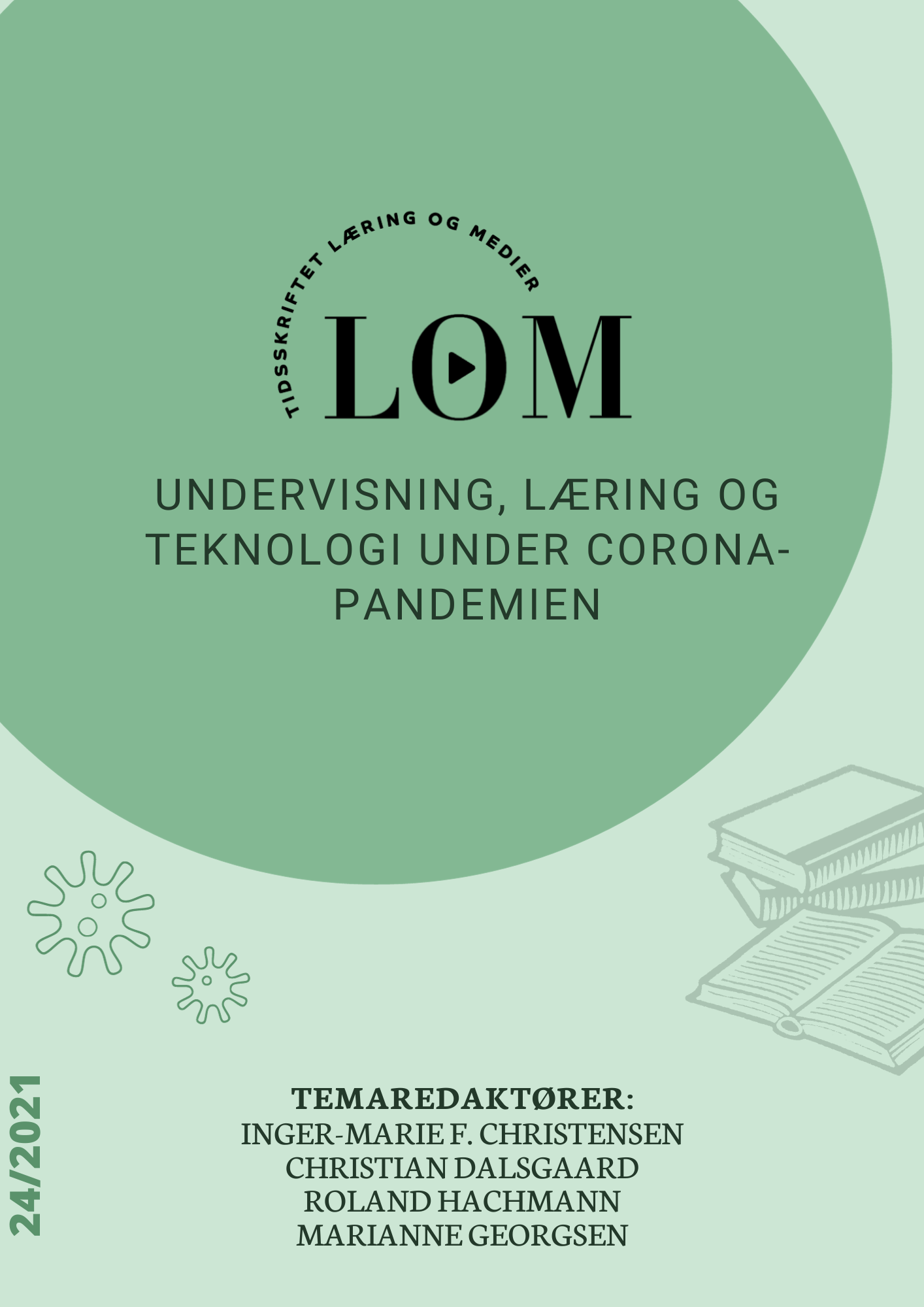Dansk
Dansk
DOI:
https://doi.org/10.7146/lom.v14i24.125686Keywords:
DanskAbstract
In 2020, the COVID-19 pandemic changed the everyday life of educational institutions worldwide. The situation has demanded answers, on the part of both students and the educational institutions, on how teaching could continue despite restrictions that made face-to-face teaching impossible. This article analyses how strategies for digitally supported learning was experienced and developed from "emergency teaching" in the spring to autumn's parallel and hybrid approaches at a PBL university in Denmark. The study is based on a large set of qualitative data that gathers experiences of digital teaching across all faculties and departments at Aalborg University and consists of 22 focus group interviews with teachers and students conducted from September to November in the autumn of 2020. Subsequently, the data was transcribed and coded in NVivo and analysed using thematic analysis, drawing a holistic view of ongoing digital learning activities, including approaches to and the importance of the physical space and social relations in hybrid problem and project-based learning. The article thus contributes with knowledge about and perspectives on how digital transformation can support active and collaborative learning in participant-led learning environments, such as PBL.
Downloads
References
Bayne, S., Evans, P., Ewins, R., Knox, J., & Lamb, J. (2020). The Manifesto for Teaching Online. MIT Press.
Bertel, L. B., & Kristensen, N. S. (2018). Student Engagement and Study Intensity in Flipped PBL Curriculum and Blended Learning Activities. I 7th International Research Symposium on PBL: Innovation, PBL and Competences in Engineering Education (s. 116-125). Aalborg Universitetsforlag. International Research Symposium on PBL.
Braun, V., & Clarke, V. (2006). Using thematic analysis in psychology. Qualitative research in psychology, 3(2), 77-101.
Danmarks Evalueringsinstitut (2021). Erhvervsskolers erfaringer med nødundervisning under covid-19-pandemien: En undersøgelse af nødundervisning i foråret og sommeren 2020. Børne- og Undervisningsministeriet.
DR. (2021). ’Vi vender ikke tilbage til det, vi havde før’: Universiteter vil beholde dele af onlineundervisningen. 19. marts 2021. Tilgængelig via: ’Vi vender ikke tilbage til det, vi havde før’: Universiteter vil beholde dele af onlineundervisningen | Indland | DR. Tilgået: 09. april 2021
Dewey, J. (1916) Democracy and education. New York: Macmillan.
Dewey, J. (1938). Experience and education. New York: Macmillan.
Flyvbjerg, B. (2006). Five misunderstandings about case-study research. Qualitative inquiry, 12(2), 219-245.
Garrison, D. R., Anderson, T., & Archer, W. (1999). Critical inquiry in a text-based environment: Computer conferencing in higher education. The internet and higher education, 2(2-3), 87-105.
Georgsen, M., & Qvortrup, A. (2021). Erfaringer og oplevelser med online undervisning på 9 videregående uddannelsesinstitutioner i foråret 2020. Uddannelses- og Forskningsministeriet.
Grabinger, R., & Dunlap, J. (1995). Rich environments for active learning: A definition. Association for Learning Technology Journal, 3, 5–34
Hodges, C., Moore, S., Lockee, B., Trust, T., & Bond, A. (2020). The difference between emergency remote teaching and online learning. Educause review, 27, 1-12.
Hüttel, H., & Gnaur, D. (2020, October). How higher education adapted to online teaching at aalborg university after COVID-19: Experiences and perspectives. In European Conference on e-Learning (pp. 243-XV). Academic Conferences International Limited.
Illeris, K. (1974). Problemorientering og deltagerstyring: oplæg til alternativ didatik. Odense: Fyens Stiftsbogtrykkeri.
Illeris, K. (2011). Kompetence: Hvad, hvorfor, hvordan? Frederiksberg: Samfundslitteratur.
King, Alison (1993). From sage on the stage to guide on the side. College Teaching. 41 (1): 30–35.
Kvale, S., & Brinkmann, S. (2015). Interview: Det kvalitative forskningsinterview som håndværk. Hans Reitzels Forlag.
Lyngdorf, N. E. R., Bertel, L. B., & Andersen, T. (2021). Evaluering af digitalt understøttet læring på Aalborg Universitet i 2020: Underviser- og studenterperspektiver på universitetets nedlukning som følge af covid-19 (ISBN: 978-87-93541-37-5). Aalborg Universitet.
Nowell, L. S., Norris, J. M., White, D. E., & Moules, N. J. (2017). Thematic analysis: Striving to meet the trustworthiness criteria. International Journal of Qualitative Methods.
Nørgård, R. T., Mor, Y., & Bengtsen, S. S. (2019). Networked learning in, for, and with the world. In A. Littlejohn, J. Jaldemark, E. Vrieling- Teunter, & F. Nijland (Eds.), Networked professional learning: Emerging and equitable discourses for professional development (pp. 71– 88). Springer. Research in Networked Learning.
Piaget, J., & Cook, M. T. (1952). The origins of intelligence in children.
Rotellar, C., & Cain, J. (2016). Research, perspectives, and recommendations on implementing the flipped classroom. American journal of pharmaceutical education, 80(2).
Ryberg, T., Bertel, L. B., Sørensen, M. T., Davidsen, J. G., & Konnerup, U. (2020). Hybridity, Transparency, Structured Freedom and Flipped Engagement – an Example of Networked Learning Pedagogy. I S. Børsen Hansen, J. J. Hansen, N. Bonderup Dohn, M. de Laat, & T. Ryberg (red.), Proceedings of the twelth international conference on networked learning (s. 276-285).
Uddannelses og Forskningsministeriet. (2008). Kvalifikationsrammen. Besøgt på https://ufm.dk/uddannelse/anerkendelse-og-dokumentation/dokumentation/kvalifikationsrammer/andre/dk-videregaaende/kvalifikationsramme_dk_videregaaende_uddannelse_20080609.pdf
Vygotsky, L. S. (1978). Mind in society: The development of higher psychological processes. Cambridge: Harvard University Press.
Aalborg Universitet. (2016). Viden for verden – Digitaliseringsstrategi. Besøgt på: https://www.strategi.aau.dk/digitalAssets/602/602500_030418_aau_digitaliseringsstrategi_web.pdf
Aalborg Universitet. (2021). Introduktion til AAUs kvalitetssystem. Besøgt på: https://www.kvalitet.aau.dk/digitalAssets/991/991511_introduktion-til-aaus-kvalitetssysten.pdf
Downloads
Published
How to Cite
Issue
Section
License
Copyright (c) 2021 Niels Erik Ruan Lyngdorf, Lykke Brogaard bertel, Thomas Andersen, Thomas Ryberg

This work is licensed under a Creative Commons Attribution-NonCommercial-NoDerivatives 4.0 International License.

Articles published in the Journal of Learning and Media are licensed under a Creative Commons Attribution-NonCommercial-NoDerivatives 3.0 Unported Licens.
Authors retain copyright and grant the journal right of first publication; simultaneously articles are licensend under the Creative Commons Attribution license: Attribution-NonCommercial-NoDerviatives (by-nc-nd). Read about this license at https://creativecommons.org/licenses/by-nc-nd/3.0/
---
At LOM.dk, you will also find articles from the discontinued Journal for the Continuing and Further Education of the Danish Universities (UNEV). Note that special rules apply to UNEV articles:
It is the authors and any other copyright holder who have the copyright of articles published under the auspices of UNEV, and access to the articles is contingent on users acknowledging and complying with the associated legal guidelines:
- Users may download and print one copy of any UNEV publication for private studies or research.
- The redistribution of articles or the use of these for revenue-funded activities or commercial purposes are not allowed.
- It is not allowed to distribute the URLs of UNEV articles.


